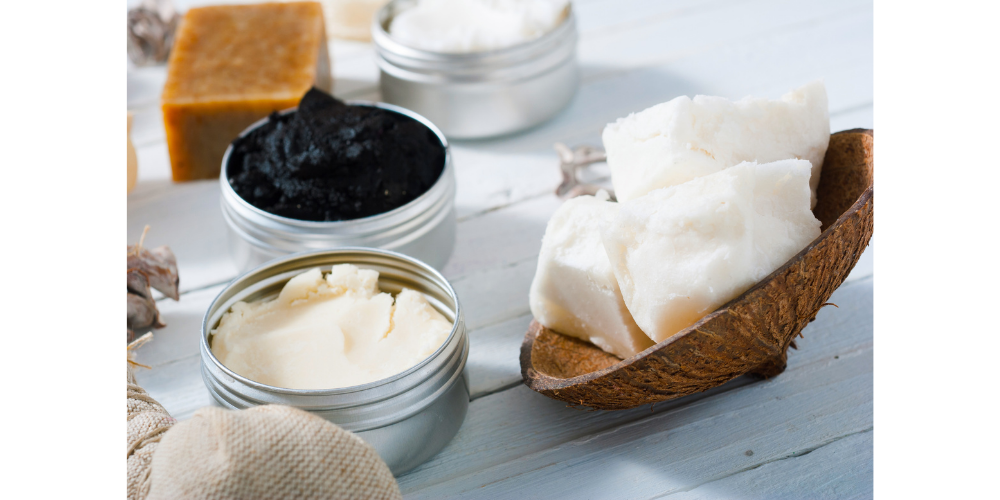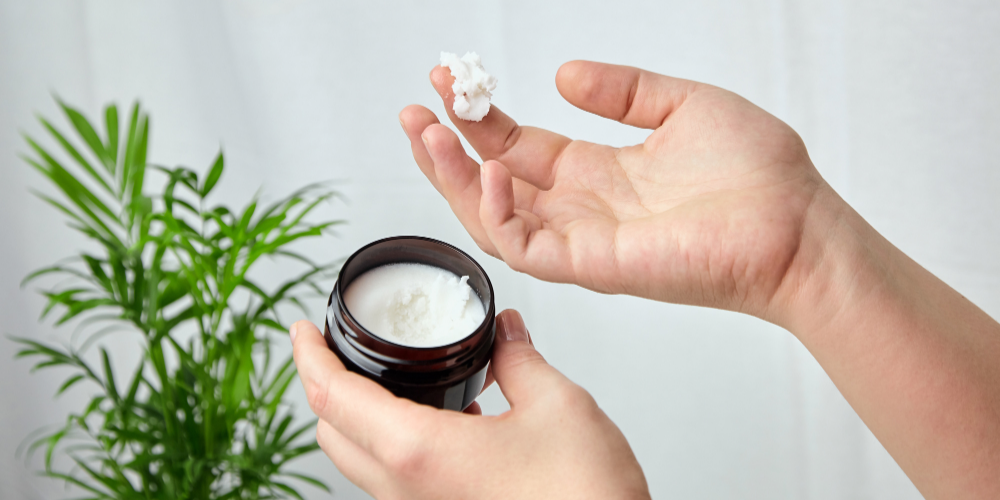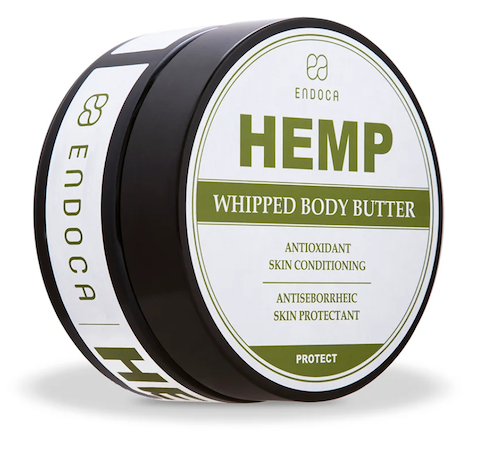What is CBD Body Butter
If you are into CBD skincare products and all other things CBD and cannabis, it makes sense that CBD body butter would pique your interest! CBD body butter is a mashup of one of the most luxurious topicals for the skin and the health benefits of CBD—without any of the high of THC.
In this post, we’re covering what CBD body butter is and why it’s good for the skin. We’ll cover the difference between body lotion and body butter (and other topicals). We will talk about the uses for and benefits of body butter generally and why there’s an added benefit to CBD in body butter.
Finally, we’ll talk about how to make your own CBD body butter using CBD isolate! It’s easier than you think to make the best DIY body butter, and we have recommendations for both CBD isolate for your own homemade CBD body butter and for store-bought body butter if you’re not into DIYing it.
TOC
- What is CBD Body Butter
- How is Body Butter Good for the Skin
- Body Lotion vs Body Cream vs Body Butter
- Uses for and Benefits of Body Butter
- Why CBD in Body Butter
- How to Make Your Own CBD Body Butter using CBD Isolate and Your Favorite Body Butter
- We Recommend Extract Labs CBD Isolate
- If You Don’t Want to DIY, We Recommend: Endoca Hemp Whipped CBD Body Butter
What is CBD Body Butter
Body butter is an extra-thick skin moisturizer, usually found in jars or tins that are flatter and wider so you can easily access the amount you want more easily. Typically body butter gets its thick consistency from organic vegetable-based oils and butters such as nourishing coconut oil or shea butter. These ingredients are important beyond their smooth, rich consistency, though; they are a must for any body butter due to their moisturizing and hydrating properties.
For people with very dry skin or problem areas, body butters are particularly effective at rejuvenating and nourishing dry skin in patches or all over. It clings well to the skin and forms more of a barrier than lighter lotions. Body butters are very useful during the winter months and for people who work or play outside a lot.
CBD body butter is infused with some form of CBD, whether it be CBD isolate, broad-spectrum CBD extract, or full-spectrum CBD extract. In most cases, to create a CBD body butter that is shelf-stable, CBD isolate is the best choice.
Some CBD body butters also use CBD hemp oil that is rich in hemp terpenes and helps the skin revitalize and maintain a youthful glow. CBD is itself an antioxidant, so these kinds of CBD body butters are potentially very nourishing to the skin.
How is Body Butter Good for the Skin
There are several ways to use body butter to optimize your skin’s health.
Basic Tips
Leave some body butter on your skin, don’t rub it in completely, to create a soothing, protective barrier.
When applying your body butter, pay special attention to problem areas such as knees, elbows, ankles, feet, and hands. These are all regions that benefit from extra attention because they tend to be prone to dryness.
To apply body butter, place a generous scoop directly on your skin and massage the body butter into the skin gently using broad, firm strokes until it is mostly absorbed but a thin layer remains.
Timing: After Shower and Overnight
Use body butter right after your shower while your skin is still saturated with moisture to lock it in. Just pat dry, leave plenty of hydration on the skin.
Use body butter anytime day or night, but apply body butter just before bed for an overnight moisture treatment that is more intensive. Remember, leave plenty on the skin to work overnight.
To treat problem areas overnight, apply body butter liberally to hands and/or feet, and put on a soft pair of cotton socks and/or gloves.
Customize Your Routine
People with dry skin, those who work outside, and those whose skin needs more protection benefit from using body butter every day. But for people with normal to oily skin, acne, or sensitive skin, every 2 to 3 days, on problem areas, or as a weekly treatment might be a better plan.
Body Lotion vs Body Cream vs Body Butter
Body lotions, body creams, body butters, and related topical products all keep your skin hydrated, healthy, and soft with natural ingredients—yet they are very different. It’s important to realize that different skin types demand different products because there are so many options on the market.
Light vs Heavy
Lotion, specifically CBD lotion, has a non-greasy feel and is lighter than body butter, so it absorbs into the skin quickly. It’s a great option for those with not so dry skin because lotion is actually an emulsion blend of water and oils, not just fats. When you really need moisture that’s a little lighter, especially on the hands where extreme dryness isn’t an issue or the face, lotion is often best.
Lotion is non-sticky and often more hydrating initially because its water content is higher. (This is one reason butter users benefit from timing their application soon after a shower.) Lotion’s water content is higher, so it carries less fatty matter and spreads more readily. It can be used anytime and doesn’t clog pores, making it non-comedogenic.
However, with that heavier, slightly more balm-like feeling, body butter has a more substantial texture than lotion. It doesn’t add that initial boost of moisture from water content; instead, it forms a protective barrier and seals in what is already there. Body butter is ideal for people with dry skin generally, who live in arid, desert weather, who work outside, or who are fed up with dry patches on the hands, feet, elbows, knees, and legs.
Raw vs Refined Ingredients
For more intensive moisturizing or rougher skin, use body butter. This is also true for general body skin, but not sensitive areas like the face. That’s because unlike facial creams, body butters contain raw, less refined ingredients that are more basic. Due to these factors along with less water content and spreadability, applying body butters to sensitive facial skin can cause discoloration or acne.
Pores: Potential for Clogging
Along these lines, body butter typically contains shea butter, cocoa butter, and coconut oil or other vegetable-based oils. It’s more effective at rescuing problem skin because it’s thicker than lotion, but this also means it has the potential to clog pores.
The Bottom Line: Body Butter vs Body Lotion
The difference between body butter and lotion is mainly that there is more fat content from oils in body butter, giving body butter a thicker consistency than body lotion and greater suitability for very dry skin. Therefore, the right choice really depends on your goals and your skin type.
Uses For and Benefits of Body Butter

Best-suited to dry skin, natural, organic body butters are richer and thicker than body lotions and creams. They protect the skin with high amounts of natural butters from cocoa, shea, or mango butters or natural oils such as almond, coconut, grape seed, hemp seed, or jojoba to protect your skin.
Yes, these make great all over body moisturizers, but these body butters are for a lot more than just slathering on your skin when you want it to feel softer:
Remove makeup. A tiny bit of body butter on a cotton pad, like other oily makeup removers, works to dissolve the day’s makeup right away. It even removes waterproof mascara—just don’t get body butter in your eye and use only a small amount. Wash your face when you’re done with a facial cleanser.
Nourish your hair. Natural body butter can replenish stressed, dry hair. Just rub it into dry hair and then wash hair as normal.
Problem patches. Body butters rehydrate and protect dry patches on ankles, elbows, knees, and heels. Apply liberally and cover with soft cotton cloth to boost your benefits.
Tired spots. Spots like your lips or neckline may benefit from body butter, especially CBD body butter that’s loaded with antioxidants.
Scars and stretch marks. Use body butters to reduce the appearance of scars and stretch marks with fatty acids and vitamins.
Hands and feet. If you work outside, a rich body butter soothes dry palms and cracked knuckles and restores dry cuticles. Turn an ordinary day into a spa day and pamper your feet with body butter and a foot rub.
Soothe legs after hair removal. However you do it—shaving, waxing, or laser—it probably hurts and annoys your skin. Soothe and hydrate your skin all day with body butter.
Some of the benefits of using body butter include:
Moisture. Natural body butters keep the skin moisturized with natural ingredients such as emollients from nut and seed oils. Most lotions contain water, but body butter does not. Once applied to the skin, it lasts longer than any lotion and any extracts or scents in it last longer, too.
Nutrition. All body butters benefit the body with their essential omega 3 fats which help calm inflammation and moisturize. For example, shea butter is common in body butters and has been used for years to improve the skin. It contains vitamins A, E, and F and is known for hydrating the skin, nourishing it, and reducing inflammation. Shea butter is also rich in various acids (linolenic, oleic, palmitic, and stearic) that nourish and protect the skin and boost natural collagen production.
Protection. Body butters lock in moistures, forming a protective barrier over the skin that reduces the skin’s exposures to free radicals in the hot sun, dry air, and cold winter weather.
Experience. People love using body butters and report smooth, supple, silky, soft skin after using them. Some body butters can relieve dry, cracked skin and promote balanced, healthy skin even among people with psoriasis, eczema, and other skin conditions.
Value. With body butter, a little goes a long way, even if you have really dry skin. This is why it can ease up the pressure on your budget. And if you’re trying to administer CBD via a topical, it’s an awesome thick alternative that doesn’t get wasted.
Why CBD in Body Butter
The difference between body butter and things like lotion, explained above, is the reason you use them. Plus, if you know you want a CBD topical, your specific use for it may shape the right choice. But specifically, CBD lends itself naturally to body butter for a few reasons.
Cannabidiol or CBD is one of the Cannabis sativa or hemp plant’s active compounds. As a powerful antioxidant, it protects from free radical damage and calms irritated skin. The reason you usually consume CBD suspended in oil is because, like other cannabinoids, it is lipid-soluble, not water-soluble. As a result, cannabinoids like CBD must cling to lipid molecules to be delivered into the body.
When you use a CBD topical, a thicker topical that lasts long enough to soak into the skin works best for this reason—you’re giving the skin a chance to absorb the CBD. Body butter is a high fat substance, so it can both hold high levels of CBD and cling to the skin longer to deliver it.
The skin has its own endocannabinoid system, and like the ECS in the body itself, the skin’s ECS helps keep the skin balanced and healthy. CBD topicals can help support wellness and produce healthy skin by promoting stasis. Generally, some kind of imbalance is the root cause of most skin problems.
By avoiding the GI system and sticking to external use, applying CBD topicals may result in more constant plasma levels, allowing patients to more effectively manage inflammation and pain associated with arthritis. According to the American Academy of Dermatology, topical CBD products may also be used to treat acne, eczema, and psoriasis.
Serving size, source, and quality control how effective topical CBD is, however, just like with other forms of CBD.
CBD topicals serve a unique purpose. Because topical CBD does not reach the bloodstream like other forms of hemp extract, these products are mostly used to treat muscle spasms, chronic pain, and tension. In other words, you’re just spot treating the cannabinoid receptors local to a particularly painful place on your body with a topical anti-inflammatory instead of treating your entire system.
[Disclaimer: The US Food and Drug Administration FDA has only recently begun to regulate this area. Before beginning to use a new product, check with your doctor, dermatologist, or another healthcare provider first.]
How to Make Your Own CBD Body Butter using CBD Isolate and Your Favorite Body Butter
Ready to take the plunge and DIY this? CBD isolate is pure CBD in the form of crystalline powder, and it’s really easy to mix into a recipe, just like sugar or flour.
It’s cooling off outside, so dry, cracked hands are coming, especially with this level of hand washing in our future. And let’s face it, tension headaches, period cramps, and sore muscles are never ending! Here’s how to make CBD body butter:
Time: 45 to 60 minutes
Ingredients
- 1 cup total organic raw butter, solid, chopped, your choice: (shea butter or cocoa butter)
- 1 cup total vegetable-based oils, soft or melted, your choice: (coconut oil, almond oil, hemp oil, grapeseed oil, or olive oil—we like a coconut oil and almond oil blend the best)
- 6 tablespoons magnesium oil
- 2 to 4 tablespoons CBD isolate, depending on how strong you want it
- Multiple drops of lavender, eucalyptus, peppermint, clary sage, tea tree oil, bergamot, or whatever essential oils you prefer (start with 15 to 30, go slow)
Optional additional organic ingredients
- goat’s milk
- mica powder for color
Instructions
Makes just over 2 cups.
Melt butter(s) and any solid oil(s) over a double boiler. Do not heat liquid oils.
While still hot and totally liquid, stir in CBD isolate until dissolved.
Add in liquid oils, magnesium oil, and essential oils of your choosing.
Remove from heat and allow to cool for 30 minutes or until it is close to a butter thickness.
Whip the mixture with an electric whisk, hand-held mixer, or stand mixer for 1 to 2 minutes until a fluffy body butter results. Move the final product to an airtight container, and store for 2 to 3 months out of direct sunlight.
Use only high-quality essential oils without synthetic ingredients to avoid adverse reactions. Never use essential oils in or on your ears or eyes.
Avoid adding alpha-hydroxy acid, retinoids, and artificial fragrances to CBD body butter because they can irritate your skin.
We recommend Extract Labs CBD isolate for use in this recipe. It’s an award-winning way to add CBD to your routine anyway, but this CBD Isolate is also lab-tested, CO2-extracted source of American-grown, hemp-derived CBD. It’s simple to use, and once you get started, you’ll love spoiling yourself with this stuff!
Can you use CBD oils in CBD body butter? Yes, but it can impact the shelf life and texture. It works much more smoothly with CBD isolate, in our experience.
Best CBD Body Butter
If You Don’t Want to DIY, we recommend Endoca Hemp Whipped CBD Body Butter instead.
This Hemp Whipped CBD body butter from Endoca has an ultra-smooth texture and a high dose of natural CBD goodness. The nourishing combination of shea butter, cocoa butter, coconut oil and hemp seed oil will leave your skin silky smooth and soft, while replenishing any moisture lost through everyday wear and tear. And because it’s a nice and thick, high-quality body butter, you know that barrier will allow the CBD to continue working on your skin for a long time.
The body butter is a slightly thinner option than the Endoca Hemp Salve—a bit less greasy, too—and a perfect choice if you want the moisture but not that slick feeling later. We liked it best for joint and muscle pain but also just for basic nourishment of dry skin. Listed benefits of this CBD body butter include:
- Antioxidants such as vitamin E
- Anti-seborrhoeic, oil-controlling benefits that can help control acne
- Skin protecting and conditioning from natural food-grade cocoa butter, shea butter, palm oil, and coconut oil
- Other natural ingredients including beeswax
- Pleasant aroma from natural vanilla
- 300mg to 1500mg CBD
- No artificial colors, no preservatives, gluten-free, cruelty-free, vegan, non-GMO
- 100 percent GMP certified organic products are controlled from seed to shelf
- Third party laboratory testing guarantees purity
If you really just don’t want to hassle with making your own, you can’t do better than Endoca Hemp Whipped CBD Body Butter.
Final Thoughts on CBD Body Butter
Body butter is one of those things that seems trendy but actually works really well. It lends itself naturally to carrying CBD because it is high in naturally-occurring fats and forms a protective barrier on the skin that allows the CBD to work with the skin’s endocannabinoid receptors. In all, it’s a great choice among CBD topicals.


